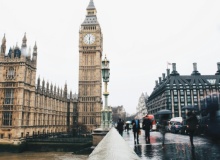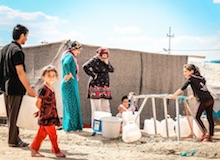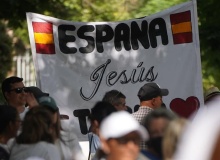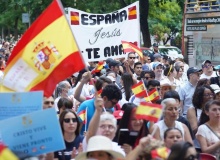

.jpg)
Last year, 12,045 terminations of pregnancies were recorded. Abortions are legal in the first twelve weeks.

Ahead of the election of 4 July, a survey conducted by the Evangelical Alliance United Kingdom found that 93% of evangelicals would like to see more Christians engaged in politics.
.jpg)
Despite the continuing decline, the Roman Catholic Church continues to represent 24% of the population. The national Protestant Church also lost hundreds of thousands last year.

World Refugee Day was marked by increasing numbers of displaced people (120 million) and a limited political response. “No NGO can stop a war”, says an evangelical group.

A Gallup report shows that up to 44% of workers feel stressed. “The Bible talks about stress a much more than we think”, say evangelical experts.
The US International Commission on Religious Freedom warns in its annual report that several governments have engaged in the repression of religious minorities.
.png)
Abortions soar by 17% in 2022 after the implementation of early abortion procedures at home, which accounted for six out of ten pregnancy terminations.
.jpg)
The Church of Scotland falls from 32% to 20% in only one decade. Roman Catholics represent 13% while “other Christians” remain at 5%.
.jpg)
In cities like Basel, over half of the population does not adhere to a religion. Protestants fall most.

The intersection of physical and spiritual health among frontier peoples.
.jpg)
Religion has shaped our past, for better and for worse, and remains an integral part of the social, political and cultural fabric of life in Northern Ireland.
.jpg)
A new survey shows that younger Christians are more committed to their faith. Experts are “surprised at high rates of religious practice” as 65% say faith has a role in general society.
.jpg)
Reinhardt Schink of the Evangelical Alliance says “forms of church can be adapted” but warns against decisions that strengthen individualism and “weaken the community of believers”.

Official data show that the number of non-religious people has increased by over 13% since 2010.
.jpg)
Youth attending a worship place regularly are expected to have an average fertility rate of 2.1, much higher than the average for any European country.
.jpg)
In eight years, the church attendance of men aged 15 to 29 more than doubled. Researchers see no parallels in women or in other Nordic countries.

For the third year since 2020, Isaiah 41:10 is the most highlighted, bookmarked, and shared verse of the year worldwide.

New data from a group focusing on church planting points to immigration as a key element in the growth of Spanish churches in the last decade.
.jpg)
Less than one in four abortions were reported as a matter of “serious risk to life or health of the pregnant woman or risk of severe foetal abnormalities”.

In the Southern European country, evangelical churches are the religious minority that grows the most, nearly tripling the presence of Muslim worship places.
.jpg)
A “first of its kind” survey conducted in France shows that evangelicals are more interested in environmental care than the average population.
.jpg)
More than half of those who leave Roman Catholicism in the region turn to evangelical churches, finds a survey.
.jpg)
The latest official figures, published in July, show that only one in five practice Catholicism, while atheism exceeds 16%.

42% of young people do not consider themselves religious, finds the newest official survey. Islam is clearly on the rise.

The United Bible Societies statistics show that the upward trend of last year continued. Most Bibles were distributed in Spanish and English.

Las opiniones vertidas por nuestros colaboradores se realizan a nivel personal, pudiendo coincidir o no con la postura de la dirección de Protestante Digital.